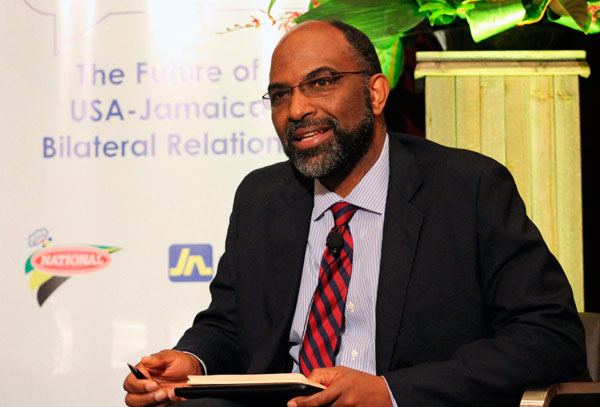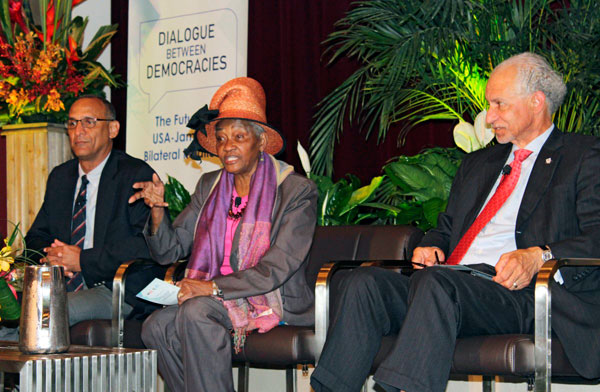Former NYC Council Member Una S. T. Clarke speaking on crime and violence says society needs “to find a way to provide for the poor and uneducated by giving them not a handout, but a hand up.”
Clarke was one of the panelists at the Dialogue Between Democracies: Security and Good Governance forum which took place at the New York Hilton Midtown, 1335 Ave. of the Americas on Thursday, March 24, 2016. This event was the fourth in a five-part dialogue held with Jamaicans locally and overseas.
“I want to stress the fact that not only in Jamaica, but in any area where there is poverty and need for educational growth, it breeds crime because at the heart of it, people want to provide for their families and sadly there are times when they will do this by any means necessary,” she said.
The other panelists were Dr. Damien King of the Caribbean Policy Research Institute, former Ambassador to the United Nations (Security Council Affairs) Curtis Ward and General Manager of the Jamaica National Building Society, Earl Jarrett. Joshua Polacheck, counsellor of Public Affairs at the U.S. Embassy in Kingston, Jamaica moderated the discussion.
Dr. Damien King, executive director of CaPRI, believes that the forum serves to explore practical measures to strengthen civil society and enhance its impact as an agent for improving governance in Jamaica. In that regard, the purpose of the discussions was to address policymaking, accountability, transparency, access to information and the development of informed public opinion.
“What we hope to achieve from these discussions are feasible ways to advance security cooperation in areas, such as defense and maritime security; as well as, identify ways in which we can strengthen Jamaica’s social institutions,” Dr. King indicated.
Ward added, “Both countries need each other. The relationship between the United States and Jamaica span centuries. We in the diaspora have been great advocates for Jamaica / U.S. relations. Forums like Dialogues Between Democracies provide us with the opportunity to highlight areas of cooperation and collaboration between the United States and Jamaica, primarily in the areas of security from national, regional and global threats.”
Moderator Polacheck pointed out, “Through this international relationship, Jamaica now has the largest civilian maritime law enforcement presence in the Caribbean.”
This transitioned into the topic of job creation to which Dr. King warned, “We need to be very careful with the idea of governmental responsibility to create jobs because what we have seen in the past is that this has been used as an excuse to divert public resources that ought to have been invested in facilitating business activity, but instead ended up being more of a waste of community resources.”
However Ward pointed out that government does have a role to play. “While government may not have the responsibility to create jobs, they do have the responsibility to create an environment for job creation. That responsibility includes removal of bureaucratic red tape, graft from the political, public and private sectors and prosecuting graft at every level so that business in the country can be done seamlessly. Those are some of the ways that jobs can be created.”
Further, he maintained that strengthening Jamaican institutions by limiting corruption, enhancing transparency and respect for the rule of law will improve trust in the political process, in addition to opening doors to greater domestic and international trade.
Dialogue Between Democracies follow in the same vein as other panel discussions about security and good governance, which were held in Kingston, Jamaica, in January of this year. Those discussions highlighted many key points, including the continued strong security cooperation between Jamaica and the USA through training and capacity building; and, facilitated perspectives on issues, such as what could be deemed as the security force’s reliance on extraditions to the USA, which some participants surmised could consequently weaken local law enforcement institutions.
The last topic of discussion was how the Jamaican brand could be used as a force for overall development and growth of the country of Jamaica. Jarrett gave his insight on the matter. “Jamaica has been through a long and hard journey despite still being a relatively young country. We are at a place in history where the time for the more complicated work needs to be done. Jamaica’s economy has been transformed into something that is more service based. It’s time that the modern tools of good governance be applied to Jamaica; it’s a time where we have to think more. We have to apply modern expertise and part of that expertise is shown by how we project our country and how we as citizens of Jamaica become more engaged; it is shown by how we invest and speak about our island as well as how we address those ills that are in the island. We must move from those days where, ‘Informer fuh dead!’ It is up to us, the citizens of Jamaica and those outside of Jamaica to make a difference and to continue this dialogue between the two peoples of Jamaica and the U.S.”
Dr. King maintained, “In the final analysis, we hope to find the most effective ways for both Jamaica and the United States, strong democracies in partnership, to cooperate in pursuit of their mutual interests. We believe these forums will provide a platform which will facilitate the voicing of different opinions on the current partnership between our countries, and in so doing to identify ways in which the partnership may be strengthened.”


























